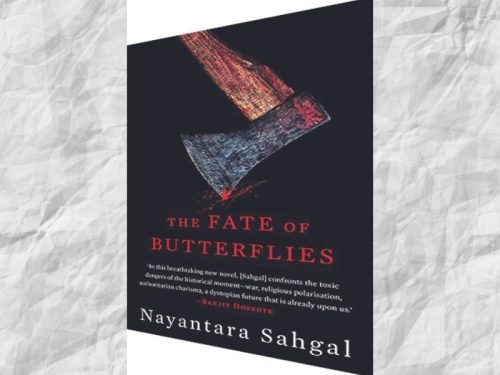No products in the cart.
Whose India binary: The Fate of Butterflies
 THE FATE OF BUTTERFLIES
THE FATE OF BUTTERFLIES
Nayantara Sahgal
SPEAKING TIGER
Rs.455, Pages 144
The Fate of Butterflies by the redoubtable Nayantara Sahgal is another testimonial to her versatile imagination. Interweaving personal and the political like many of Sahgal’s earlier books, this novel narrates a history of the present from a fast receding liberal-secular perspective.
Butterflies traces the story of several people but centres mainly around Prabhakar, a professor of political science who has risen from destitution to becoming a respected author, caught in the maelstrom of contemporary history, and Sergei, a Russian arms dealer who has given up the idea of writing a book narrating the story of the trade to concentrate on his father’s business, and has shed his Russian inheritance and identity and assumed one of cosmopolitanism. It also includes, inter alia, Francois and Prahalad, a gay couple who own and run Bonjour, a fine dining restaurant and breakfast venue. Very quickly the novel establishes a cosmopolitan identity as the composite or definitive Indian identity.
It is this identity that’s at stake in a majoritarian India, where pluralities are suppressed to present a singular, monolithic identity based solely on religion. At the heart of the narrative is also the story of Katerina, who, along with some rural women, is brutalized, gangraped and left to die. The novel also recounts the impact of polarization on Rafeeq and Rahman — an intrepid chef and owner of Kaif Cafe — who suddenly find that they are strangers in a country they had previously called their own.
The trajectory of Prabhakar’s life is rudely interrupted one day when he comes across a corpse on the crossroads, naked but for a skullcap on its head. The pervasive violence of public life intersects in the story with his increasing intimacy with Katerina/ Katya. The novel is a political allegory providing a snapshot of the times we live in. The author maps the swing to the Right not only in the national but in a broadly international context. It narrates the rise of jingoistic nationalism and xenophobia in countries, leaders and people in Europe and an increasingly growing sense of intolerance in people of ‘others’.
While the composition of the ‘other’ is shown to vary from one place to another, the core idea is communicated in no uncertain terms. The political discussion is around Prabhakar’s book in which his protagonist Mirajkar expresses interest in a hypothetical overturning of the traditional virtues of altruism and tolerance to replace them with a Nietzschean (and dystopic) view of history. Having endorsed eugenic experiments and the somewhat Darwinian perspective of ancient Spartans more as a hypothesis than anything else, Prabhakar realises that his book runs the risk of being appropriated by a ruthless, authoritarian regime to provide a theoretical bulwark and justification for taking extreme measures.
Coming at a time when right-wing populism is ruling the roost, Butterflies is a timely reminder of what is at stake in the relentless pursuit of muscular nationalism that has emerged in countries which have been hitherto acknowledged as among the most liberal, progressive and secular democracies. When we read Mirajkar’s words and witness enactment of Prabhakar’s worst fears and fantasies, we realise that at stake is not just liberal and progressive political values, but our own humanity. That, and a belief in core life-affirming values of freedom, mutual tolerance and harmony, values that emanate from our belief in a common humanity we share with our brethren.
Sahgal’s style and perspective may be criticised as being elite cosmopolitan, but the book makes a strong plea for sanity, and is a salutary reminder of threats, internal and external, that beset us. The characters seem to belong to an earlier, gentler time, till they are brought face to face with escalating hatred and tension captured in the metaphoric title of the book, which faintly echoes Shakespeare’s King Lear: “Like flies to wanton boys/ Are we to the gods/They kill us for their sport.” As social polarization and division escalates into hatred, violence spreads its tentacles and strengthens its grip, even as the spiralling and incremental maelstrom creates an atmosphere where fomenting hate and fear is the order of the day.
Whose India is it anyway is a question that lies at the heart of Sahgal’s latest novel. While Sahgal’s legacy or idea of India is of Nehruvian cosmopolitanism and liberalism, it’s a reminder that there are those whose idea of nationalism is steeped in blood, guts and gore. In short, who are the inheritors of the nation state — proponents of civic nationalism or primordial nationalists?
In The Fate of Butterflies, we are presented with ample evidence of Sahgal’s feistiness and political courage. She has never hesitated to tell it like it is, and has once again demonstrated that she is not afraid to speak truth to power.
Meenakshi Malhotra
Also Read: Wide but not deep















Add comment